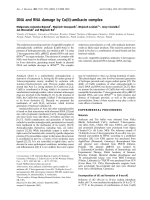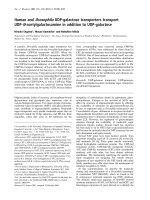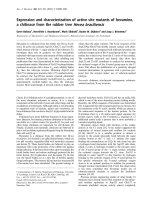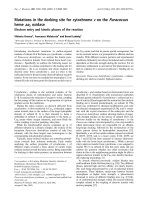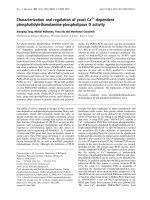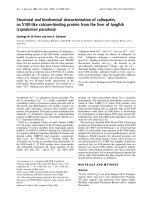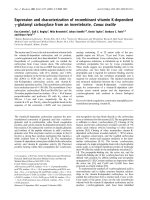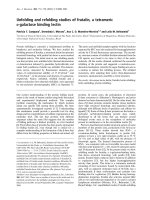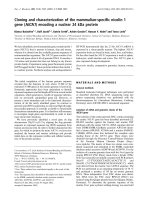Báo cáo y học: "Advice and dissent" doc
Bạn đang xem bản rút gọn của tài liệu. Xem và tải ngay bản đầy đủ của tài liệu tại đây (147.42 KB, 3 trang )
Petsko: Genome Biology 2009, 10:113
Former US President George W Bush was not a man given
to irony. Yet, asked where he got his information, he replied,
“The best way to get the news is from objective sources. And
the most objective sources I have are people on my staff.”
Sadly, for the United States and for the world, he was not
being ironic - he actually believed what he said. The notion
that people close to the king typically try to remain close to
the king by telling the king what he wants to hear does not
seem to have occurred to that remarkably unreflective man.
Woe betide the courtier who troubles his or her monarch
with unpleasant realities. Professor David Nutt must now
understand this principle better than anyone. Until a few
weeks ago he was the chairman of the UK’s Advisory
Council on the Misuse of Drugs (ACMD) - an independent
expert body that provides scientific advice to the British
government on drug-related issues, including recommen-
da tions on how to classify the dangers of cannabis
(marijuana), ecstasy, and other drugs of abuse. On 30
October 2009, David Nutt was summarily fired by the
British Home Secretary, Alan Johnson, for giving the
government advice and then criticizing it for not taking it.
That advice concerned the thorny issue of reclassification,
of cannabis in particular. Few subjects illustrate the divide
between conservatives and liberals more starkly than
drugs, and cannabis is the drug that provokes the most
heated debate. People may argue about whether all drugs
should be legalized, but they generally agree that heroin
and cocaine are dangerous substances that can have severe
psychotropic effects. Cannabis, however, is viewed so
differently by liberals and conservatives that one’s opinion
on its harmful effects could serve as a shibboleth for
distinguishing the two philosophies. Most liberals consider
marijuana a relatively harmless recreational drug, along
the lines of alcohol but less addictive and not so socially
damaging, whereas most conservatives regard it as a tool of
the devil - a drug that, in addition to producing all manner
of terrible side-effects, is guaranteed to lead its user down
a slippery slope to more dangerous drugs.
In Britain, cannabis was originally classified in 1971 in The
Misuse of Drugs Act as a Class B drug. The category was
created specifically for cannabis and some other drugs
(such as amphetamines) as a compromise between those
who thought cannabis was as dangerous as heroin (Class
A) and those who thought it was a ‘soft’ drug like the
benzodiazepines (Class C). After several abortive attempts
to reclassify it, marijuana was officially downgraded to
Class C in 2004 after a recommendation by the ACMD.
These classifications can have significant consequences: if
cannabis is a Class B drug, people convicted of possessing
it could, in principle, face up to 5 years in prison, compared
to a maximum of 2 years if it were Class C. In 2008,
however, the then Home Secretary Jacqui Smith rejected
the advice from the ACMD to keep cannabis at Class C and
moved it back to Class B, despite the council’s extensive
review of evidence concerning its long-term effects,
including any link to mental illness.
David Nutt, who was appointed chair of the ACMD in
2008, reacted angrily to this decision. In October, in a
lecture given at Kings College London on a briefing paper
prepared for the London-based Centre for Crime and
Justice Studies, he publicly accused ministers of “devaluing
and distorting” the scientific evidence over illicit drugs by
their decision to reclassify cannabis to Class B against the
advice of the ACMD. In deciding to speak out, he was
probably also stung by the government’s decision, in Feb-
ruary of this year, to veto another ACMD recommendation,
following a review of 4,000 papers on the subject, that the
drug ecstasy be downgraded from Class A. His public
criticism of the government was rapidly followed by his
dismissal from the ACMD by Alan Johnson, a government
action that has ignited a firestorm of editorials and
comment, including predictable references to the Catholic
Church’s prosecution of Galileo in 1633 (for a set of links,
see />No one questions the government’s legal right to sack some-
one they appoint; at issue here is the cause. It cannot be a
question of competence: David Nutt is certainly well
qualified. A professor at both the University of Bristol and
Imperial College, London, he is a specialist in the psycho-
pharmacology of depression, addiction, insomnia and other
psychiatric disorders. The stated reason for his dismissal
was that, by going public with his dissent, he made it
impossible for the government to send a clear and consistent
message about drugs to the public.
Comment
Advice and dissent
Gregory A Petsko
Address: Rosenstiel Basic Medical Sciences Research Center, Brandeis University, Waltham, MA 02454-9110, USA.
Email:
113.2
Petsko: Genome Biology 2009, 10:113
A number of people agreed with that decision. In an
opinion piece in The Telegraph on 7 November, Alasdair
Palmer wrote, “Prof. Nutt isn’t a martyr to science who lost
his job merely for confronting the government with
incontestable facts. He was sacked because, as Mr Johnson
insisted, ‘he cannot be both a government adviser and a
campaigner against government policy’.” He goes on to say
that “Prof. Nutt’s views on policy matters … are not
straightforward inferences from the scientific facts … the
harm that cannabis can cause in teenage brains is a good
reason for, as the government says, ‘erring on the side of
caution’ and classifying cannabis as a Class B drug, with
heavy penalties for those convicted of possession. The
science does not force you to that conclusion - but then it
does not force you to the conclusion that cannabis should
be downgraded to Class C.”
But many scientists were appalled by the government’s
actions. Two members of the ACMD immediately
resigned in protest, and three more have resigned since,
raising the possibility that the committee might no longer
have enough expertise to do its job. And a week after
Nutt’s dismissal, more than 20 academics, including
Martin Rees, the President of the Royal Society, sent the
government a set of guidelines that they say “would
enhance confidence in the scientific advisory system and
help government to secure essential advice.” The guide-
lines assert that “dis agree ment with government policy
and the public articula tion and discussion of relevant
evidence and issues by members of advisory committees
can not be grounds for criticism or dismissal.” When
scientific advice is rejected, they said, the reasons should
be described explicitly and publicly.
Ironically, Nutt’s sacking took place just days after the
British government had issued a statement about the
importance of independence in scientific advice that said,
in part, that scientists should not be criticized for
publishing scientific papers or making statements as
professionals, independent of their role as government
advisers. So why was David Nutt sacked, really?
My guess is that it had relatively little to do with the issue
of scientific independence and a lot more to do with the
peculiar nature of drugs as a political and social lightning
rod. Few issues, short of abortion, raise the moral outrage
of the Right as reliably as a suggestion that we should go
softer on those who use certain drugs. Governments
advocate such positions at their peril. Facing a hostile
electorate because of the financial crisis, together with a
strong challenge from a reinvigorated Conservative Party,
the Labour government of Gordon Brown probably felt it
could ill afford to be seen as being anything but hard-line
on any drugs issue at this time. Not firing Professor Nutt,
they obviously thought, would send a mixed message to the
voters about their confidence in their drugs policy.
Regardless of the underlying motives, this case should
have a powerful resonance in the United States. For 8 of
the past 9 years, the American government deliberately
mis represented and ignored scientific advice whenever
that advice contradicted the ideology of those in power. It
routinely put poorly qualified scientists and even non-
scientists in ‘scientific’ advisory positions, so long as they
passed the litmus test of political and religious attitudes.
The government edited scientific data and conclusions out
of reports, and persecuted government scientists who
questioned its policies. So bad was the situation that, when
he was elected, President Barack Obama felt the need to
address this problem publicly in both his Inaugural
Address on 20 January 2009 (“We will restore science to
its rightful place”) and in a speech he gave before the
National Academy of Sciences on 27 April (“…we have
watched as scientific integrity has been undermined and
scientific research politicized in an effort to advance pre-
determined ideological agendas”).
Ignoring and marginalizing science has a long, sorry
history in the United States. One of the main reasons for
the failure to develop a firm policy on the climate crisis can
be seen in the persistent tendency of several adminis-
trations to find that handful of scientists who disagreed
with the majority opinion and listen only to them.
Confronted with scientific evidence that one of his
cherished beliefs was simply not supported by the facts,
President Ronald Reagan would simply dismiss it by
saying, “Oh, I don’t think that’s true.” The Eisenhower and
Truman administrations stocked their scientific advisory
boards with physicists who shared their militaristic, cold-
war anti-communist philosophy, and in some cases
persecuted those (J Robert Oppenheimer, for example)
who begged to differ.
The tension between scientific advice and policy advice
remains strong. I believe that it is the function of a
scientific adviser to any government to provide advice
purely on scientific matters. Your job, in other words, is to
tell your bosses what the data say. If the data are relatively
unambiguous and there is good consensus on their
interpretation, that needs to be said. If there are reasonable
opposing conclusions that are supported by reliable
measurements, it is important to see that those views are
aired. But a scientist has to be careful about advocating a
particular policy in response to the science. If science can
say that there is a probability that a particular policy would
have severe negative consequences, it is essential that
governments be told that. But in general, policy is a matter
not for scientific advisers but for politicians.
Politicians, we are constantly told, acquire and retain
power by deceit and salesmanship, and frequently are
contemptuous of the people they profess to serve. But, true
as that cliché might be (and happily there are some notable
113.3
Petsko: Genome Biology 2009, 10:113
exceptions), it is their job to get something done, and
getting something done frequently requires making com-
promises that appall or offend the scientist. A good
politician usually keeps his or her options open. I agree
completely with the guidelines proposed by the 20
academicians in Britain, which state that scientific advisers
should not be dismissed for public criticism of policy
decisions - but I would issue a caution to those advisers
who contemplate doing so.
Scientific advisers should be free to air their views, and not
just on matters of science. But they need to understand the
consequences. Politicians are naturally suspicious of
anyone with an agenda, and not being reluctant to spin the
facts if it serves their purpose, they are quick to believe that
others will do so as well. If scientific advisers seem to be
advocating particular policies, their scientific objectivity
will come into question, regardless of the solidity of their
conclusions. David Nutt was right to criticize a policy
decision that he felt went against the science. But it led to
his being removed from a position where he might have
been able to influence such policies in the future. If we
want governments to learn to trust scientific advice, we
have to ensure that such advice is seen to be objective, as
well as actually being so. In his position, would I have done
what Professor Nutt did? Probably, but with one significant
difference: I would have resigned before going public with
my criticism, thereby establishing the separation between
my duties as a scientific adviser and my duty as a
concerned scientist to speak out about a flawed policy. I
also think the Labour government overreacted, and in so
doing turned a debate about drug safety into one about the
independence of scientific advice and the limits of dissent.
Instead of looking tough on drugs, they came across as
being afraid of the truth.
We as academics cannot give the advice governments need
to hear if we are seen as just another political faction with
its own (usually liberal) agenda. The great strength of
science is that its conclusions are evidence based. Scientific
advice, like Caesar’s wife, must be above suspicion. If we
appear to stray, we lose.
Published: 24 November 2009
doi:10.1186/gb-2009-10-11-113
© 2009 BioMed Central Ltd
